Marketing: Definition & Proven Ways to Improve Your Marketing Skills
Marketing is an indispensable field when businesses want to increase profits and brand recognition. This article will help you better understand marketing through the definition and analysis of marketing. At the same time, we will also talk about effective marketing channels and ways to improve marketing skills.
What is Marketing?
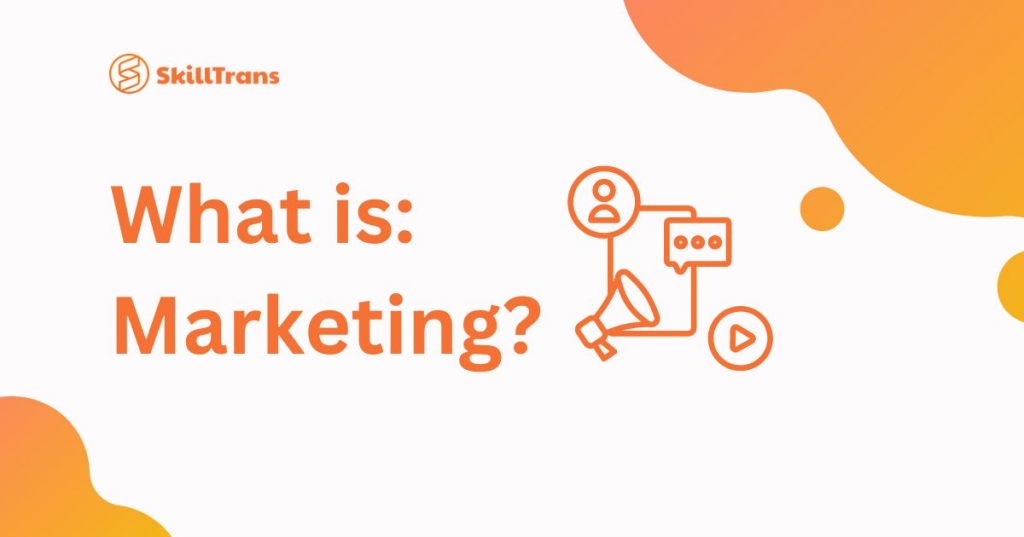
There are many definitions of marketing; we will start with the most used definitions:
According to The American Marketing Association (AMA), Marketing is defined as "The activity, set of institutions, and processes for creating, communicating, delivering, and exchanging offerings that have value for customers, clients, partners, and society at large".
According to Dictionary.com, Marketing is defined as "The act or business of promoting and selling products or services, including market research and advertising".
According to Forbes, they define marketing as "every part of a plan to turn a prospective consumer into a happy and satisfied customer. It includes everything from market research to advertising. The goal of marketing is to convince a person that your product is worth Investing in, establish brand loyalty and increase overall sales".
So, in simple words, marketing is all about creating, promoting, and selling products or services. It involves activities like advertising, market research, and the overall process of convincing people that a product is valuable and worth buying. The ultimate aim is to turn potential customers into happy and loyal buyers while boosting overall sales.
Marketing is often divided into two main branches: Traditional Marketing and Digital Marketing. Both have strengths and weaknesses, and the development of these two branches is also different. Keep reading to find out.
Traditional Marketing vs. Digital Marketing
Let's briefly review the history of traditional marketing and digital marketing:
Traditional Marketing
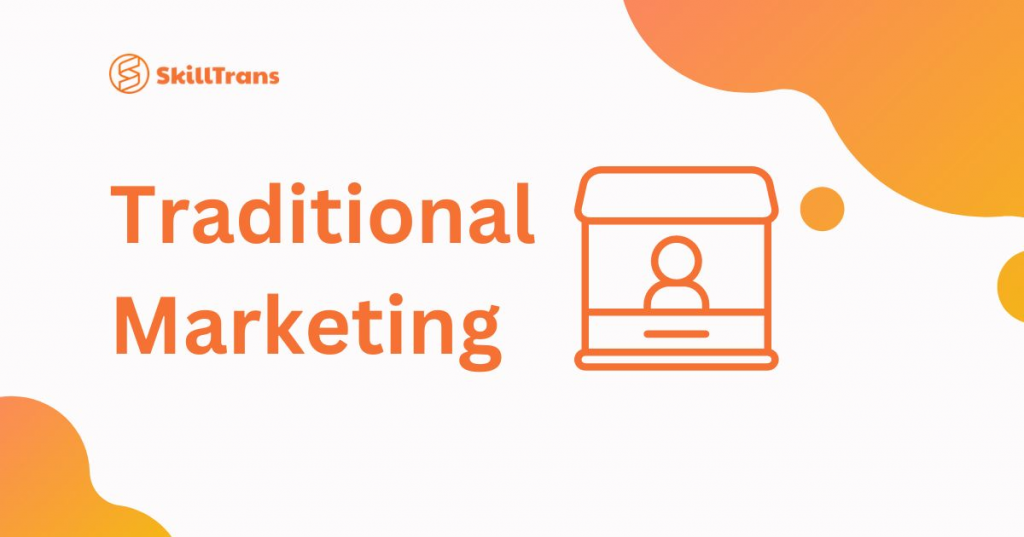
Origins: Traditional marketing has been around for centuries, evolving alongside the growth of commerce. It started with simple forms like handwritten signs and evolved with the invention of the printing press, enabling mass production of advertisements.
20th Century: In the 20th century, traditional marketing flourished with the advent of radio and television. Companies began using these mediums to reach a broader audience through commercials. Print media, including newspapers and magazines, also played a significant role.
Digital Marketing
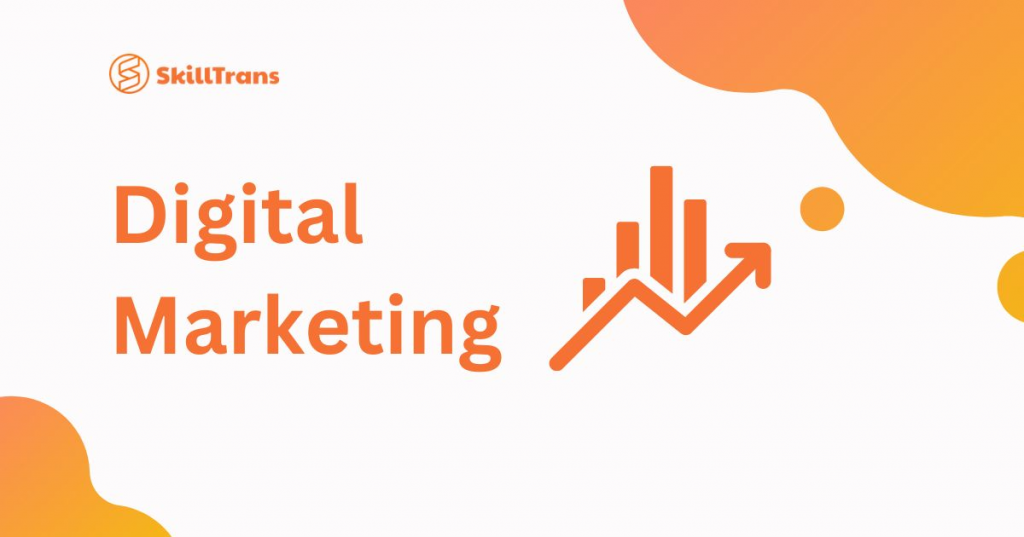
Emergence of the Internet: The birth of digital marketing can be traced back to the advent of the internet in the late 20th century. The World Wide Web became accessible to the public in the early 1990s, opening up new avenues for marketing.
1990s: Rise of Search Engines: The mid-1990s saw the rise of search engines like Yahoo! and later Google. This marked the beginning of search engine optimization (SEO) as a key aspect of digital marketing.
Social Media Era: The 2000s witnessed the emergence of social media platforms like Facebook, Twitter, and LinkedIn, providing new opportunities for businesses to connect with their audience.
Mobile Revolution: The proliferation of smartphones in the 21st century further transformed digital marketing. Mobile marketing, apps, and responsive web design became essential components.
Traditional vs. Digital Marketing: Strengths and Weaknesses
| Features | Traditional Marketing | Digital Marketing | |
| Strengths |
| Targeting: Precisely target specific demographics and interests. Cost-effectiveness: Often more budget-friendly than traditional marketing. Measurability: Track and analyze campaign performance in real-time. Scalability: Easily adjust campaigns based on results and audience response. | |
| Weaknesses | Limited targeting: difficult to reach specific demographics or interests. Measurement: Measuring effectiveness can be difficult and time-consuming. Cost: Can be expensive, especially for reaching a large audience. Adaptability: Slow to adapt to changing trends and audience preferences. | Competition: High competition for attention in the digital space. Intangibility: Can be challenging to create a tangible brand experience. One-way communication: Limited ability to interact directly with customers. Privacy concerns: Balancing personalization with user privacy can be challenging. |
Traditional vs. Digital Marketing: Strengths and Weaknesses
Many businesses today use a combination of traditional and digital marketing strategies for optimal results. The effectiveness of each approach depends on the specific product, target audience, and marketing goals.
Effective Digital Marketing channels
Although traditional marketing is still widely applied, only large businesses with budgets can apply it. Therefore, we will learn about effective digital marketing channels first:
Social Media Marketing
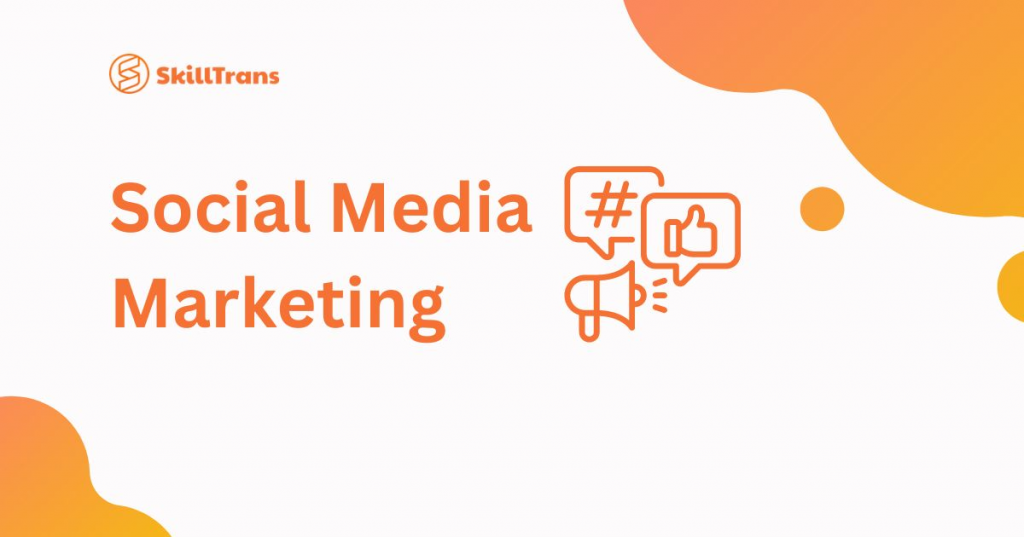
Social media marketing is the practice of promoting your content, ideas, or business on social media platforms like Facebook, Instagram, or X (a.k.a. old Twitter). You create content, share it, and connect with people to raise awareness and interest. Creating a social media profile is also a way to increase brand recognition and accessibility to potential customers and provide support for current customers.
SEO
SEO stands for Search Engine Optimization. It is a popular marketing method that most businesses apply. Basically, SEO is activities such as writing content, editing website structure, and customizing website components to be as search engine friendly as possible.
Affiliate Marketing
Affiliate marketing is like earning commissions for promoting other people's products. You share a special link and when people make a purchase through that link, you get a percentage of the sale. It's a way to make money by recommending products you like or products you support.
Email Marketing
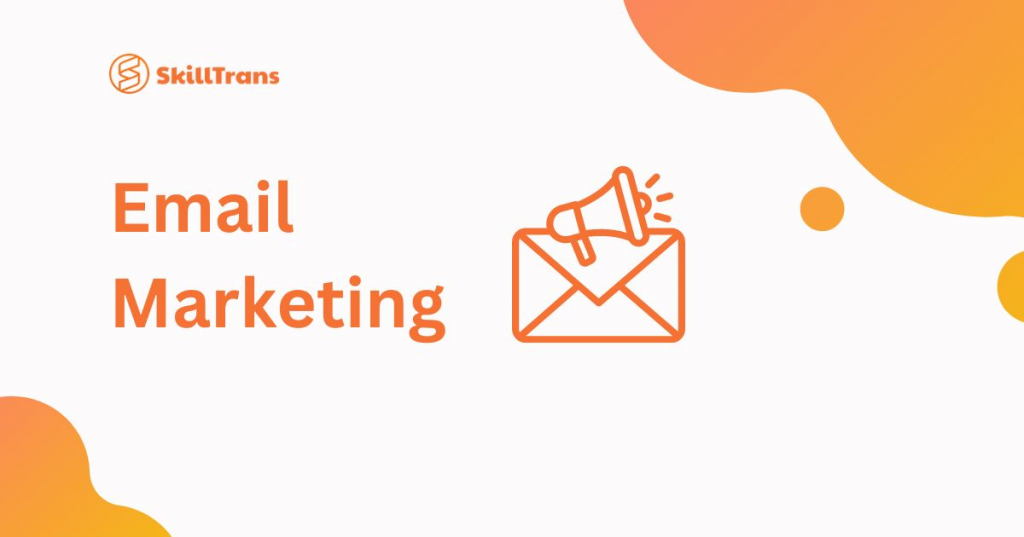
Email marketing is sending emails to people who want to hear from you. It helps you share information, promotions or updates with your audience. In short, it is a way to stay connected with your subscribers through their email inboxes.
Video Marketing
Video marketing is using video to promote your message, product or service. It's a way to create engaging visual content to connect with your audience, whether it's on social media, a website, or another platform. Video can help tell your story and attract attention, while increasing authorship and improving the content of your product.
PPC
PPC, or Pay-Per-Click, is a type of online advertising in which you pay a small fee each time someone clicks on your ad. It's a way to attract visitors to your website and only pay for actual clicks, making it a cost-effective method of increasing traffic. Popular platforms for PPC today are Facebook, Google, X (the former name was Twitter), TikTok, and more.
Influencer Marketing
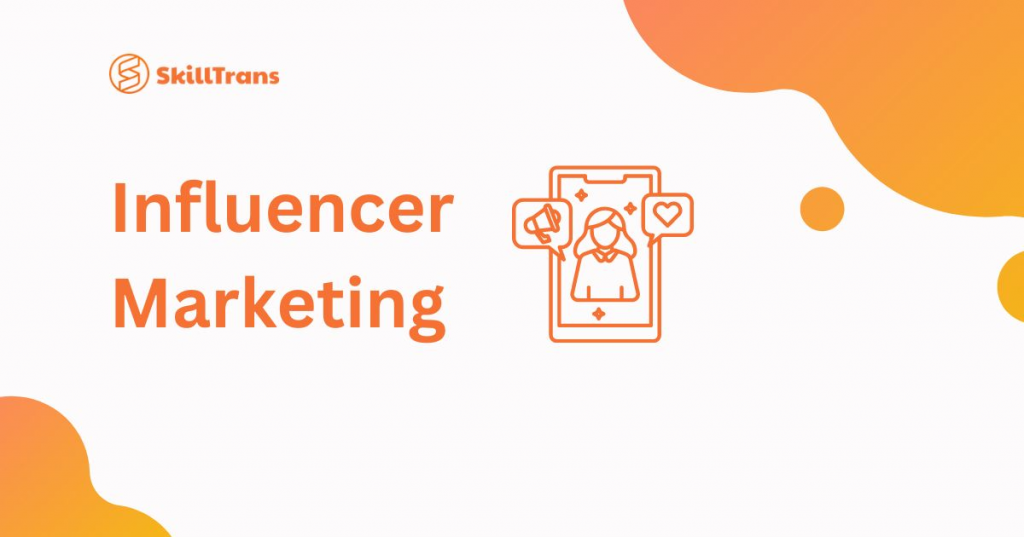
Influencer marketing is how you partner with people who have good social media followings, influencers, or a certain fan base. You pay or collaborate with them to promote your product or service. It's a way to leverage their influence to reach a wider audience and build trust with potential customers.
How to Choose the Best Digital Marketing Channels?
Choosing effective digital marketing channels for your business is a strategy that makes your business successful. For more details:
Necessary marketing channels cannot lack Social Media Marketing, SEO, Affiliate Marketing, Email Marketing, and Video Marketing. These are Marketing channels that every business can implement thanks to their resources, without the need for a budget to pay a third party like Google or Facebook.
Channels like PPC and Influencer Marketing can be deployed later, but PPC can be prioritized because Influencer Marketing depends on many factors and has associated risks.
Proven Ways to Improve Your Marketing Skills
The field of marketing is always changing, and it needs people who can adapt and have the right skills to understand its complexities. Whether you've been working in this field for a long time or you're just beginning, improving your marketing skills is really important for doing well. Here are some effective ways to step up your marketing abilities and the benefits they bring:
Get the Basics Right

Understand your audience: To do good marketing, you need to know who you're talking to—their age, what they need, and what they like. This helps you shape your message and plans to connect with them better, leading to more people getting interested and taking action.
Care about results: Marketing isn't just about making ads; it's about getting real, measurable outcomes. Learn to set clear goals, use relevant data to see how well you're doing, and keep track of your progress. This way, you can adjust your plans based on what works and make sure you're spending your resources wisely.
Have clear goals: Every marketing thing you do should have a specific goal—like making more people know about your brand, getting new leads, or selling more. Setting clear goals helps you stay on track and see how well your efforts are doing.
Keep Learning All the Time
Take courses and get certified: There are lots of courses online and offline, plus certifications and workshops that can give you the newest marketing know-how and tools. Doing these helps you stay ahead and become really good at new skills that match what you want to achieve.
Follow the experts: Stay in the loop about what's happening in the industry by keeping up with good blogs, social media accounts, and publications from marketing pros and organizations. Always learning like this makes sure you're adjusting to the changes and using the newest ideas.
Apply What You Know
Get real-world experience: Find chances to use what you've learned in actual situations. Offer to help with marketing projects for non-profit groups, do freelance work for small businesses, or start your own projects. Doing this helps you try out your skills, create a portfolio, and learn important things.
Try new things: Be open to testing out various marketing ideas and methods. A/B testing is a great way to compare different approaches and figure out what your audience likes the most. Trying new things like this helps you grow, be creative, and find the best ways to run your campaigns.
Build More Skills

Improve how you communicate: Being really good at both writing and speaking is crucial for creating interesting marketing messages. Work on expressing your ideas clearly, telling stories well, and making a connection with your audience emotionally.
Learn about data analysis: Knowing the basics of analyzing data helps you understand marketing information better. This means you can make smart decisions by using insights from how your campaigns are doing and how your audience is behaving.
Connect with Fellow Marketers
Meet other marketers: Go to industry events, join online forums, and make connections with other marketers. Building relationships lets you share ideas, learn from what others have gone through, and stay updated on the newest trends.
Find a mentor: Having a mentor in marketing is super helpful. They can guide you, share their knowledge, and give you useful career advice to help you navigate the industry.
By getting involved in these effective ways, you'll get the skills and knowledge you need to do well in the always-changing world of marketing. Keep in mind that the process of learning and getting better never stops, and your commitment to improving your skills will lead to your success
Here are some related courses Skilltrans recommends. Please click on the course name below to learn more:
Artificial Intelligence AI Marketing to Grow your Business
Do you know that you can use artificial intelligence in your marketing to grow your business and increase sales exponentially?
And to do that, you don't need to be an expert or have any special knowledge. All you have to do is follow a simple process to boost your results and escalate your marketing using the latest technology.
As we often see in the news, Artificial intelligence is the future of Digital Marketing. Companies and brands that are not using AI in their marketing will be left behind.
In this course, you will learn the easiest way to use simple tools to apply artificial intelligence in all areas of your business.
AI Google Bard Marketing + Advertising + Content Creation
If you want to take your marketing, content creation, social media, and advertising strategies to the next level, look no further than my Learn Google Bard Marketing + Advertising + Content Creation. This comprehensive course is designed to teach you everything you need to know about leveraging the power of chatbots and conversational AI to engage with customers, generate leads, and increase conversions.
Dive into the essentials of WordPress SEO with our comprehensive course, designed specifically for beginners. This journey will cover three pivotal lessons: the fundamentals of SEO for WordPress, an exploration of top SEO plugins, and practical tips for optimizing your website. Whether you're learning about Google Search Console integration, understanding plugin features like All-in-One SEO, or discovering how to leverage these tools for better search rankings, this course equips you with the knowledge to drive organic traffic and succeed in the competitive digital space.
Final Thoughts
Marketing is an indispensable field for businesses; marketers are an important factor in the success of businesses. To achieve effective marketing, marketers need to clearly understand the aspects of this field and improve the necessary skills and information every day.



